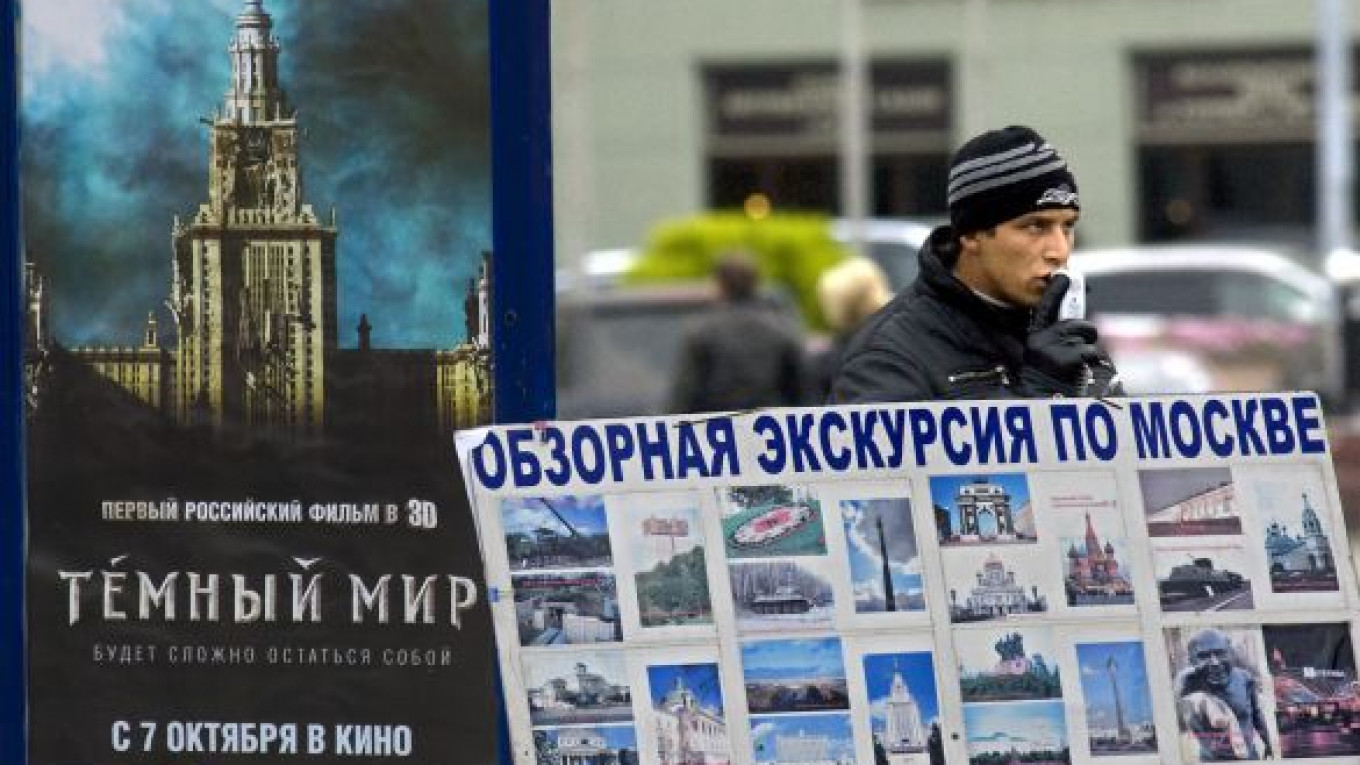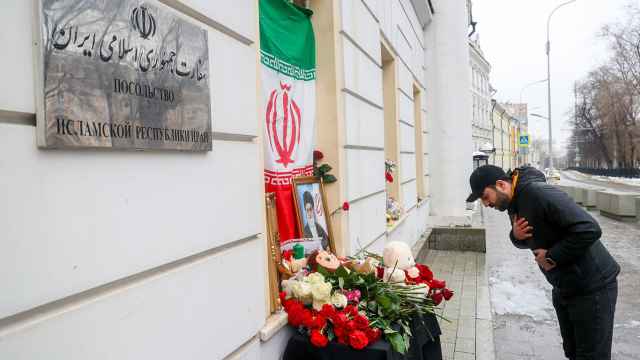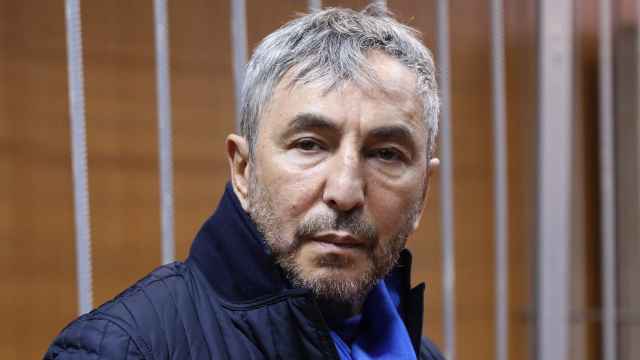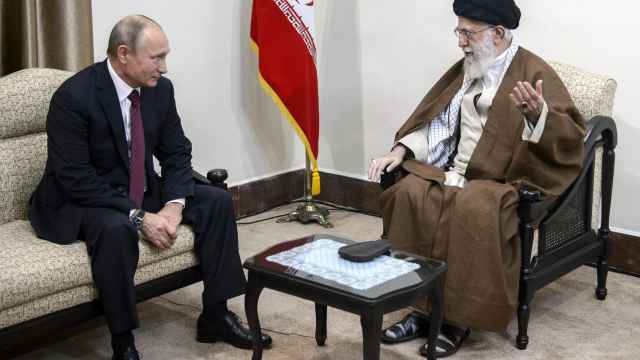Famed film director Nikita Mikhalkov looms large over a dispute about the collection of fees on imported electronic devices and blank recordable media, a business that could be worth $100 million per year.
Mikhalkov is president of the Russian Union of Rights Holders, which is competing for the government license to collect fees and distribute them among copyright holders, as well as rights to develop the entertainment industry for the next five years.
The group — which he co-founded last year with the Russian Cinematographers' Union, another organization he heads — has been in a tense competition with the Russian Society for Allied Rights as they await the state's decision on who will get the license.
The accreditation commission of the Federal Service for the Protection of Cultural Heritage met Sept. 20 to consider the groups' applications, but it said it would not make its conclusion public until after the government released bylaws governing the collection of the fees.
"The commission's decision is the darkest secret," said RSAR executive director Anzhelika Korotayeva.
The federal service did not respond to a written request for information on when the announcement would be made.
The RSAR was founded in 1997 to pursue copyright benefits from recordings made for private use. Despite the RSAR's seniority, the RURH was heavily favored to receive approval because of Mikhalkov's high profile and reports that First Deputy Prime Minister Igor Shuvalov supported his bid.
The RSAR is preparing for the worst. It threatened to go to court in the event of the RURH's selection, objecting, Korotayeva said, that there is no list of items subject to the new fee and that administrative procedures have not been followed correctly.
Alexander Kibovsky, director of the cultural heritage service, said last week that no decision would be announced until a government decree was issued specifying the equipment subject to the fee and the size of the fee, RIA-Novosti reported.
RSAR supporters sent a letter to Prime Minister Vladimir Putin last week. It had 14 signatories, the majority of whom were associated with the Bolshoi Theater.
Denis Voyevodin, a partner in the Salans law firm, characterized the competition between the organizations as a "popularity contest." He did not see a lot to praise in either side.
"Everyone is against this royalty because it seems unfair charging for a blank media holder or a TV," Voyevodin said. But the collection of funds from the sale of such items is common practice in Europe and North America, he said.
Mikhalkov's RURH proposes collecting 1 percent of the value of equipment and 3 percent of the value of media. It would pay copyright holders 15 percent of the money, with 25 percent going to support the RURH. The remaining 60 percent would go to a common fund, for yet undetermined uses.
The RSAR wants to collect 3 percent of the value of equipment and 5 percent of the value of media. It would operate on 15 percent of the money. RSAR legal department head Azamat Shapiyev said market research by an independent agency would be used to determine the distribution of the funds collected.
Mikhalkov's personality, and particularly his imperious nature, comes into consideration with his organization's application, observers said.
"The only advantage I see to the RURH is that Mikhalkov is standing behind it, so it is expected to be more transparent," Voyevodin said. "Everyone thinks Mikhalkov may use this [fund money] to support cinematography, apart from paying copyright holders. It's a good purpose, but he won't give any away."
The RSAR argued that its longer history entitles it to win in the game.
"It is a completely new association with no activity at all," Shapiyev said of the RURH. "Our goal is for everything to be examined objectively."
Neither organization has an extensive work history, however. A variety of laws on copyright protection have been passed since 1993, but no mechanism was ever designated for enforcing them. Consequently, according to the RSAR's Korotayeva, that organization spent 13 years lobbying for the institution of a mechanism.
The RSAR and RURH are each associated with a constellation of related organizations with overlapping functions. Korotayeva, for instance, is deputy director of the Russian Society for the Management of Performers' Rights. The RURH was co-founded by the Russian Copyright Society and the All-Russia Organization for Intellectual Property, in addition to the Russian Union of Cinematographers.
RURH press secretary Yulia Ivanina said the organization "unites tens of thousands who have entrusted their rights to the RURH through direct contracts."
Singer Dmitry Koldun, who represented Belarus in the 2007 Eurovision Song Contest, is among those represented by the RURH. He said the choice of an organization "made itself," since he already had an agreement with the All-Russia Organization for Intellectual Property.
RSAR's Shapiyev said his organization represented more than 5,000 rights holders.
The system being put in place now is the result of the passage of the fourth part of the Civil Code, written with an eye to meeting World Trade Organization requirements, in 2008.
"Russia is positioning itself as a law-abiding state," said Robert Smirnov, of Yakovlev & Partners Law Offices. "But there has been a big gap in the field of copyright protection in recent years."
Smirnov said a government resolution has established three criteria for the selection of an organization to collect the import fee.
Those criteria are the ability to collect and distribute money nationwide and to represent the interests of Russian copyright holders domestically and abroad, optimal cost effectiveness and "the ability to provide information on rights holders, rights entrusted to the organization's management and the objects of copyright and allied rights," that is, transparency.
Pavel Ariyevich, senior associate at DLA Piper Rus, is cautious about prospects for success.
"It is unclear how practically transparency could be achieved," he said. "Moreover, there are fears that the selection will be made by state authorities without the involvement of copyright owners' views."
This uncertainty is related to the unclear status and competence of the collecting societies in Russia, he added.
Meanwhile, efforts are continuing to improve copyright protection in Russia. A group of United Russia deputies introduced a bill in the State Duma on Monday to require telecoms operators to create reserve funds for the compensation of rights holders for the downloading of their music and films.
A Message from The Moscow Times:
Dear readers,
We are facing unprecedented challenges. Russia's Prosecutor General's Office has designated The Moscow Times as an "undesirable" organization, criminalizing our work and putting our staff at risk of prosecution. This follows our earlier unjust labeling as a "foreign agent."
These actions are direct attempts to silence independent journalism in Russia. The authorities claim our work "discredits the decisions of the Russian leadership." We see things differently: we strive to provide accurate, unbiased reporting on Russia.
We, the journalists of The Moscow Times, refuse to be silenced. But to continue our work, we need your help.
Your support, no matter how small, makes a world of difference. If you can, please support us monthly starting from just $2. It's quick to set up, and every contribution makes a significant impact.
By supporting The Moscow Times, you're defending open, independent journalism in the face of repression. Thank you for standing with us.
Remind me later.






